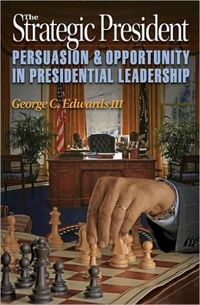

Purchase
Persuasion and Opportunity in Presidential Leadership
Princeton University Press
February 2009
On Sale: February 17, 2009
272 pages
ISBN: 0691139474
EAN: 9780691139470
Hardcover
Add to Wish List
Non-Fiction
How do presidents lead? If presidential power is the power
to persuade, why is there a lack of evidence of presidential
persuasion? George Edwards, one of the leading scholars of
the American presidency, skillfully uses this contradiction
as a springboard to examine--and ultimately challenge--the
dominant paradigm of presidential leadership. The
Strategic President contends that presidents cannot
create opportunities for change by persuading others to
support their policies. Instead, successful presidents
facilitate change by recognizing opportunities and
fashioning strategies and tactics to exploit them.
Edwards considers three extraordinary presidents--Abraham
Lincoln, Franklin D. Roosevelt, and Ronald Reagan--and shows
that despite their considerable rhetorical skills, the
public was unresponsive to their appeals for support. To
achieve change, these leaders capitalized on existing public
opinion. Edwards then explores the prospects for other
presidents to do the same to advance their policies. Turning
to Congress, he focuses first on the productive legislative
periods of FDR, Lyndon Johnson, and Reagan, and finds that
these presidents recognized especially favorable conditions
for passing their agendas and effectively exploited these
circumstances while they lasted. Edwards looks at presidents
governing in less auspicious circumstances, and reveals that
whatever successes these presidents enjoyed also resulted
from the interplay of conditions and the presidents' skills
at understanding and exploiting them. The Strategic
President revises the common assumptions of presidential
scholarship and presents significant lessons for presidents'
basic strategies of governance.
Comments
No comments posted.
Registered users may leave comments.
Log in or register now!
| 


 © 2003-2024 off-the-edge.net
all rights reserved Privacy Policy
© 2003-2024 off-the-edge.net
all rights reserved Privacy Policy